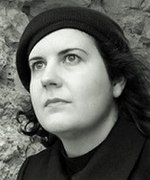About Núria Añó
- Núria Añó (Catalan: ['nu?i? ?'?o], Spanish: ['nu?ja a'?o]; born 1973 in Lleida, Catalonia, Spain) is a Catalan writer, a translator, and a speaker at conferences and symposia, where she gives papers on literary creation or authors like Elfriede Jelinek, Patricia Highsmith, Salka Viertel, Franz Werfel, Karen Blixen or Alexandre Dumas, fils.
- Añó started writing tales at a young age and published her first story in 1990.
- After that some of her short stories have been published in anthology books.
- In 1996 she was awarded the 18th City of Almenara Joan Fuster Prize for Fiction.
- Her fiction story 2066.
- Comença l'etapa de correcció (2066.
- Beginning the age of correction) or Presage, about domestic violence, both are translated into English.
- Also some articles and essays such as The Mother Tongue in Foreign Lands or about the city of Shanghai A Catalyst City for Creativity are translated into Spanish, English, French, German, Italian, Polish, Chinese, Latvian or Dutch. Her first novel Els nens de l'Elisa was third among the finalists for the 24th Ramon Llull Prize for Catalan literature, one of the most relevant literary awards in Catalan language.
- L'escriptora morta about the process of literary creation was published in 2008 and Núvols baixos about a bisexual mature actress with LGBT background among other plots such as Alzheimer's disease, in 2009.
- La mirada del fill, a novel about adoption, generational troubles between mothers and daughters and classic ballet dancer was published in 2012.
- Today, some of her novels are translated into Spanish, Portuguese, Italian, French or Dutch as well.
- According to several academic journals of literature, Añó's work is considered "one of the big promises of the contemporary narrative for Catalan Literature.".
Read more at Wikipedia
See Also
- Famous People's Birthdays on 10 February, Spain
- Famous People's Birthdays in February, Spain
- Famous writer's Birthdays on 10 February, Spain
- Famous writer's Birthdays in February, Spain
- Famous novelist's Birthdays on 10 February, Spain
- Famous novelist's Birthdays in February, Spain
- Famous essayist's Birthdays on 10 February, Spain
- Famous essayist's Birthdays in February, Spain


 Date of Birth:
Date of Birth:  Place of Birth: Lleida, Catalonia, Spain
Place of Birth: Lleida, Catalonia, Spain